Preface
Articles
>Instruments<
Musicians
Books + CDs
Links
_______________________

|
Instruments
The Sheng
The
mouthorgan
Sheng,
like its derivate, the Japanese Sho, is included
in the calssical orchestra music and stands for an ages old
instrumental tradition. Pictures on the bronze drums found all over SE
Asia date back these instruments to 1000 years BC.
The common appearance of mouthorgans in Asia is even older, some date
back over 5000 years.
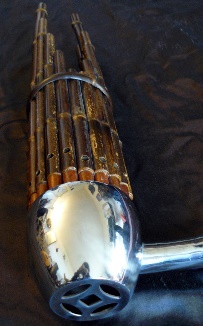 |
The Sheng
is a reed organ, consisting in various forms from 17 to 21 or even up
to 37 pipes.
The Sheng
is very loud and thus mostly performed in ensembles, it
actually
became a famous solo instrument. Some models know metallic amplifing
tubes attached to the bamboo pipes, as you can see in my Gallery.
My version with 17 pipes is tuned in a diatonic way - which is no basic model.
Other tunings
appear depending on which instrument you use: gaoyin (soprano), zhongyin (alto) or diyin
The basic metallic resonator box has a screw attached to the site to
let the saliva flow out.
Some models also know a kind of keyboard attached to the playing holes.
The ancient version had longer mouthpieces, legends say it was for the
reason that the emperor wanted to be able tp see the players faces.
The Sheng is already well known to European composers like John Cage.
Sheng artists can
be found in ensembles like the Resonance ensemble.
Playing the Sheng is not easy because it requires a perfect control of
your breathing strength. The harmonical layers and chords sometimes
have to sound through several bars and require a long, steady breath. |
Pictures (Click to expand):
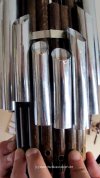
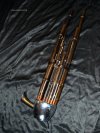
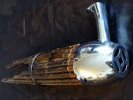
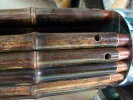
 <- Back to the overview
<- Back to the overview
|








